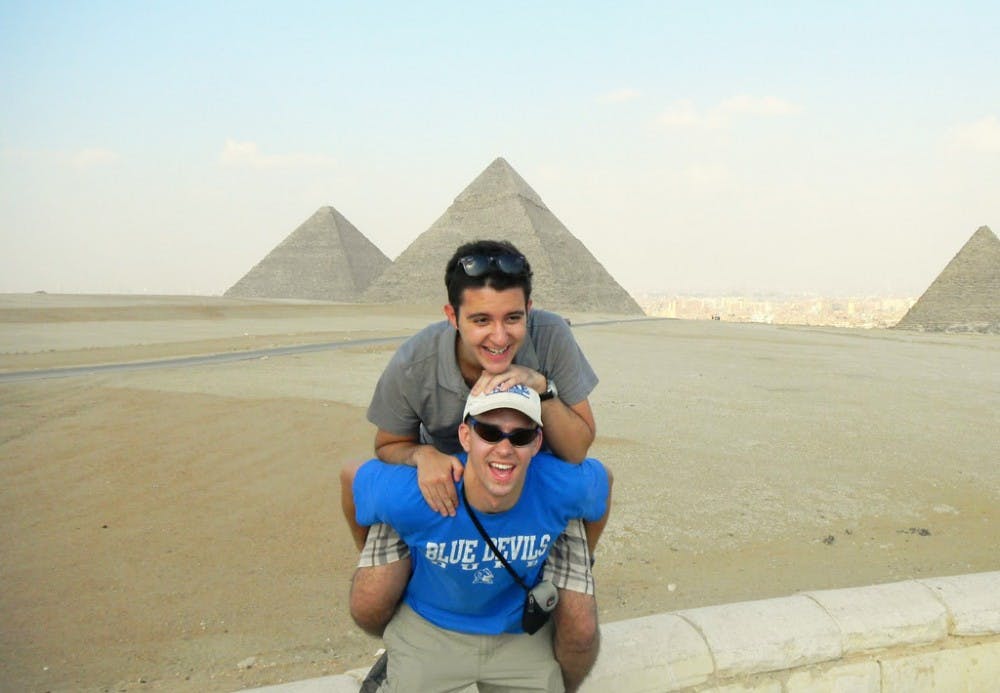Recent news of civil unrest and violence exaggerate the situation on the ground in Egypt, students living in Cairo said.
With the June election of Mohamed Morsi, the first President elected in the post-Mubarak era, Egypt is experiencing a challenging transition into a democratic state. Juniors Zac Pearlstein and Lek Badivuku are observing this political transition as the only Duke students studying in Egypt this Fall. They are taking classes at the American University in Cairo, a non-Duke program.
Reports of riots and political turmoil run rampant in American media, particularly after the tumultuous protests in mid-September, but Pearlstein noted that this is not a well-rounded picture of the day-to-day conditions in Egypt.
“It’s a complicated issue, and domestic media doesn’t cover everything. The country isn’t burning to the ground,” Pearlstein said in an email Monday. “Life goes on, and we are back to our Tuesday coffees in Tahrir Square.”
Protests emerged throughout the Middle East earlier this month following the release of an American-made video denouncing Islamic beliefs and portraying the Prophet Muhammad in a critical light. Demonstrators scaled the fortified walls of the U.S. Embassy in Cairo Sept. 11, and crowds filled the embassy throughout four days of rioting.
Coverage ought to keep in mind the scale of the protests, Badivuku wrote in an email Monday.
“While the protests did escalate by some individuals scaling the wall, in a city of twenty-three million people, a protest of 1,000 to 2,000 is quite small and localized,” Badivuku said. “Zac and I have not noticed any change in our day-to-day schedule due to the protests, nor have we encountered a situation where us being American has been a problem.’”
Many Egyptians, Badivuku added, have approached him and Pearlstein to apologize for the protests, which they said were not indicative of Egypt’s general opinion.
Both Pearlstein and Badivuku noted one of their main reasons for studying in Cairo was that they wanted to experience Egypt’s political transition through a personal perspective.
“As I read the news daily and watched from the sidelines the political fervor and civic engagement [in Egypt], I became fascinated with the country and its future,” Badivuku said.
Pearlstein added that he is gaining a more holistic view of the world because of his time in Egypt.
“Besides all the Arabic and traveling around the region, the biggest lessons have been from the little differences between our cultures,” Pearlstein said. “Experiencing the modesty in dress, new customs, food, the Egyptian society that lives here has definitely changed the way I look at the world.”
Students who are interested in studying in Middle Eastern countries often come to meetings with varying safety concerns, Margaret Riley, director of the Global Education Office for Undergraduates, wrote in an email Monday.
In the past, Duke has evacuated students from South America because of political unrest, and during the 2012 program of Duke in the Arab world, students were required to stay on campus in the days leading up to the presidential election in Egypt, she said.
“The support Duke provides to students on Duke administered programs always places paramount importance on the safety and security of our students, regardless of the region,” Riley said. “None of [the students studying in the Middle East] indicated any concern about their safety during the program.”
Get The Chronicle straight to your inbox
Signup for our weekly newsletter. Cancel at any time.

